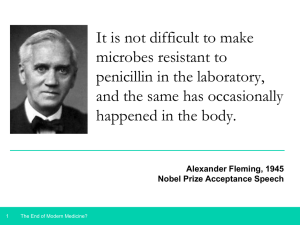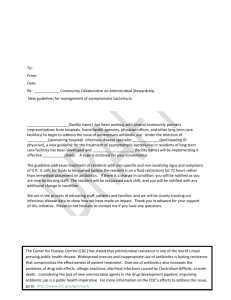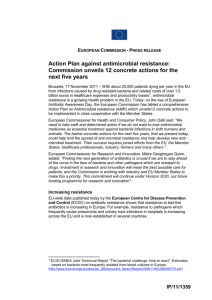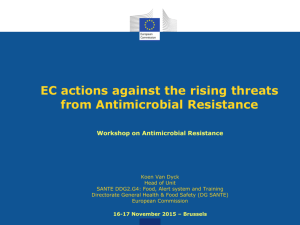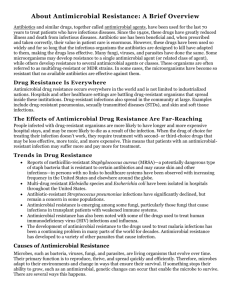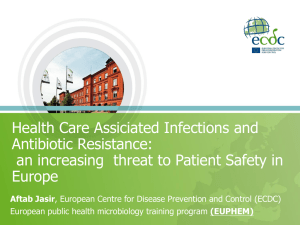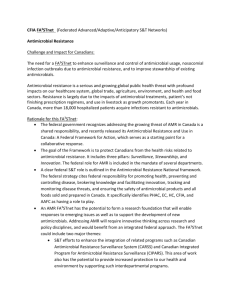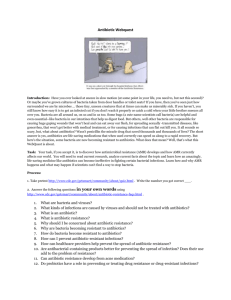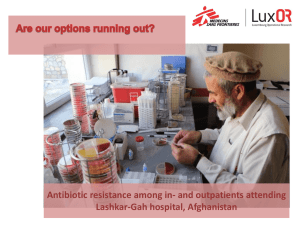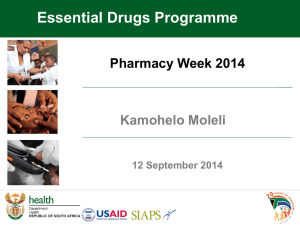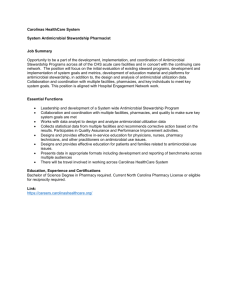Press notice
advertisement
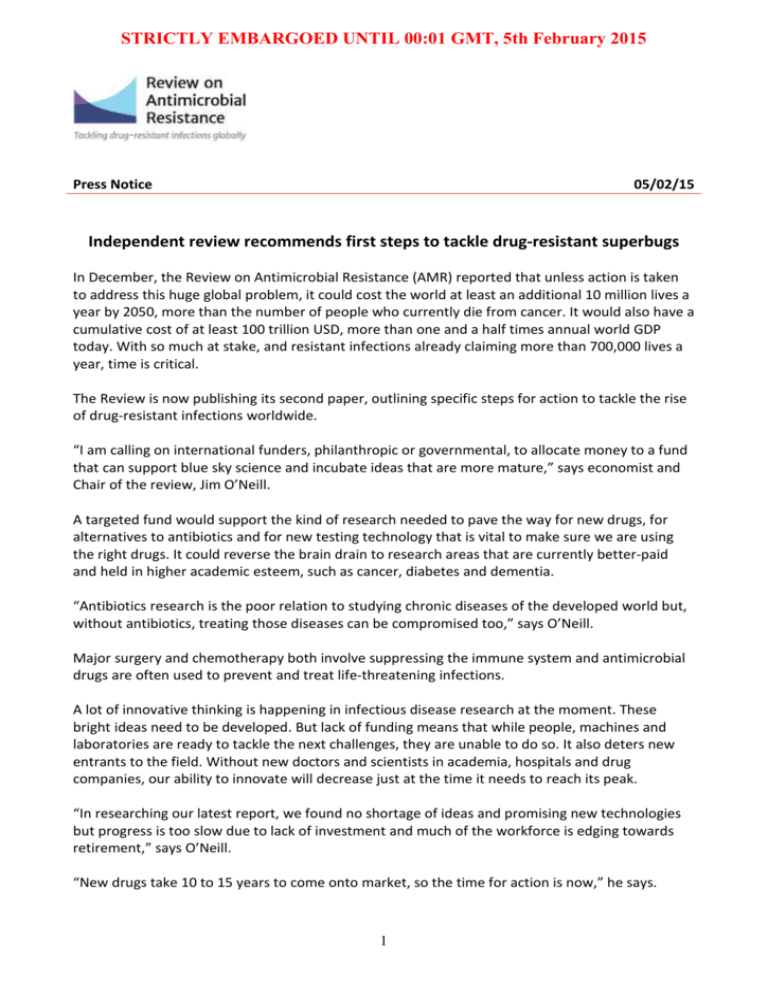
STRICTLY EMBARGOED UNTIL 00:01 GMT, 5th February 2015 Press Notice 05/02/15 Independent review recommends first steps to tackle drug-resistant superbugs In December, the Review on Antimicrobial Resistance (AMR) reported that unless action is taken to address this huge global problem, it could cost the world at least an additional 10 million lives a year by 2050, more than the number of people who currently die from cancer. It would also have a cumulative cost of at least 100 trillion USD, more than one and a half times annual world GDP today. With so much at stake, and resistant infections already claiming more than 700,000 lives a year, time is critical. The Review is now publishing its second paper, outlining specific steps for action to tackle the rise of drug-resistant infections worldwide. “I am calling on international funders, philanthropic or governmental, to allocate money to a fund that can support blue sky science and incubate ideas that are more mature,” says economist and Chair of the review, Jim O’Neill. A targeted fund would support the kind of research needed to pave the way for new drugs, for alternatives to antibiotics and for new testing technology that is vital to make sure we are using the right drugs. It could reverse the brain drain to research areas that are currently better-paid and held in higher academic esteem, such as cancer, diabetes and dementia. “Antibiotics research is the poor relation to studying chronic diseases of the developed world but, without antibiotics, treating those diseases can be compromised too,” says O’Neill. Major surgery and chemotherapy both involve suppressing the immune system and antimicrobial drugs are often used to prevent and treat life-threatening infections. A lot of innovative thinking is happening in infectious disease research at the moment. These bright ideas need to be developed. But lack of funding means that while people, machines and laboratories are ready to tackle the next challenges, they are unable to do so. It also deters new entrants to the field. Without new doctors and scientists in academia, hospitals and drug companies, our ability to innovate will decrease just at the time it needs to reach its peak. “In researching our latest report, we found no shortage of ideas and promising new technologies but progress is too slow due to lack of investment and much of the workforce is edging towards retirement,” says O’Neill. “New drugs take 10 to 15 years to come onto market, so the time for action is now,” he says. 1 STRICTLY EMBARGOED UNTIL 00:01 GMT, 5th February 2015 Five specific actions are recommended in the report, as initial steps to tackle the problem: 1. An innovation fund to support blue sky science and to incubate more mature ideas 2. Re-examining existing drugs: new doses or combinations could restore the effectiveness of existing antibiotics 3. Improved diagnostics: for accurate prescribing and to reduce unnecessary prescribing 4. Investing in human capital: training the next generation of scientists, social scientists, economists and vets whose collective minds will be needed to solve the problem 5. Tracking the spread of resistance: generating better surveillance data and using it to gather real time information The team is currently investigating market incentives in preparation for its next report in the spring. Antibiotics generate low or even negative returns on investment so new mechanisms are needed to pull companies back into the field. Whatever the final shape of the solution, it is likely to cost the world much less than 0.1% of global GDP – and that cost would be spread across ten to fifteen years. This is in stark contrast to the $100 trillion cost of antimicrobial resistance by 2050, forecast in the review’s first report in December. That study also warned of an increase in deaths caused by the problem to 2 million a year by 2050 in India and in China to 1 million a year. The review concludes that antimicrobial resistance must be placed high on the agenda of the G-20 and urges China to play a constructive role in making this happen when it assumes leadership in 2016. Quotes about the report UK Prime Minister David Cameron says: “Resistance to antibiotics is a growing problem that will have a devastating effect on modern medicine if we fail to act now. That is why I asked Jim O’Neill to investigate what more we can do and this report is an important step towards that. Governments, business and the world of science must now come together to consider how we use these findings to secure a more comprehensive international response to this crisis.” Professor Mats Ulfendahl, Secretary General of the Swedish Research Council (Medicine and Health) and Chair of the European Joint Programming Initiative on AMR, says: "We welcome this report and the focus on constructive actions to tackle AMR. As the primary focus of the Joint Programming Initiative on Antimicrobial Resistance (JPIAMR) is to promote research on AMR we strongly support the idea of setting up a global fund for research and innovation to support early-stage science. " 2 STRICTLY EMBARGOED UNTIL 00:01 GMT, 5th February 2015 Jin-Yong Cai, CEO of International Finance Corporation part of the World Bank Group, says: “Drug-resistant infections pose an urgent human and economic threat, particularly in the world’s poorest countries. Governments, health professionals and the private sector must work closely to stimulate new investment and create incentives for companies to develop antimicrobial drugs that will turn the tide against AMR. This report details common-sense steps that can be taken immediately to use new and existing resources to counter the rising rate of antimicrobial resistance.” Dr Jeremy Farrar, Director of the Wellcome Trust, says: “The review’s recommendations for action are steps that governments, funders and the research community can start acting on immediately, but there are also steps that we can take as individuals. The review recommends establishing actual or virtual centres of excellence in research. As well as developing new drugs and alternative approaches to antimicrobials, making the most of existing ones, and improving surveillance of resistant infections, these centres need to investigate the social context and behaviours that contribute to the problem and how we might learn to modify these factors.” Professor Dame Sally Davies, Chief Medical Officer for England, says: “We recognise the global scale of the problem of antimicrobial resistance and this is a clear call to action for business and science leaders to make AMR research both appealing and viable. This is the dawn of an exciting new age of discovery and use in antimicrobial treatments and I hope that other Governments around the world will also respond to this challenge in order to save millions of lives and millions of pounds in years to come.” Notes for Editors 1. AMR is the term used to describe drug-resistant infections, sometimes referred to as ‘superbugs’. Antimicrobials include antibiotics, antivirals, antiparasitics and antifungals. 2. The Report, Tackling a global health crisis: initial steps, will be published on the Review’s website at www.amr-review.org on Thursday February 5th. 3. The UK Prime Minister commissioned the Review on Antimicrobial Resistance in July of this year to address the growing global problem of drug-resistant infections. It is Chaired by Jim O’Neill and backed by the Wellcome Trust and the UK Government. 4. Jim O’Neill is an internationally published economist, and until 2013 was Chairman of Goldman Sachs Asset Management, having previously been the organisation’s Head of Economic Research. He is particularly well known for his work in relation to developing and middleincome economies having coined the BRIC and MINT acronyms – meaning that he is especially well-placed to understand the broad range of international interests at play with this topic. 5. The Wellcome Trust is a global charitable foundation that spends more than £700 million a year on advancing human and animal health. It is the second highest-spending charitable 3 STRICTLY EMBARGOED UNTIL 00:01 GMT, 5th February 2015 foundation in the world, after the Bill & Melinda Gates Foundation, investing principally in biomedical science, the medical humanities and public engagement. The Trust is providing part-funding for the work of the Review, and hosting the team at its London headquarters. This Press Release will also be available on Thursday 5th February 2015 on www.amr-review.org. Media enquiries should be addressed to the AMR team on: press@amr-review.org and 020 7611 5729. For out of hours enquiries please call Zoe on +44 (0)7786 303597, Hala on +44 (0)7715 426891 or Jeremy on +44 (0)7715 426895 4
